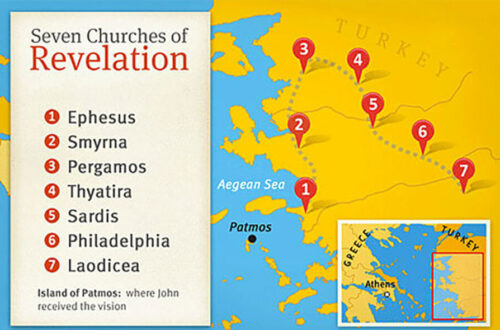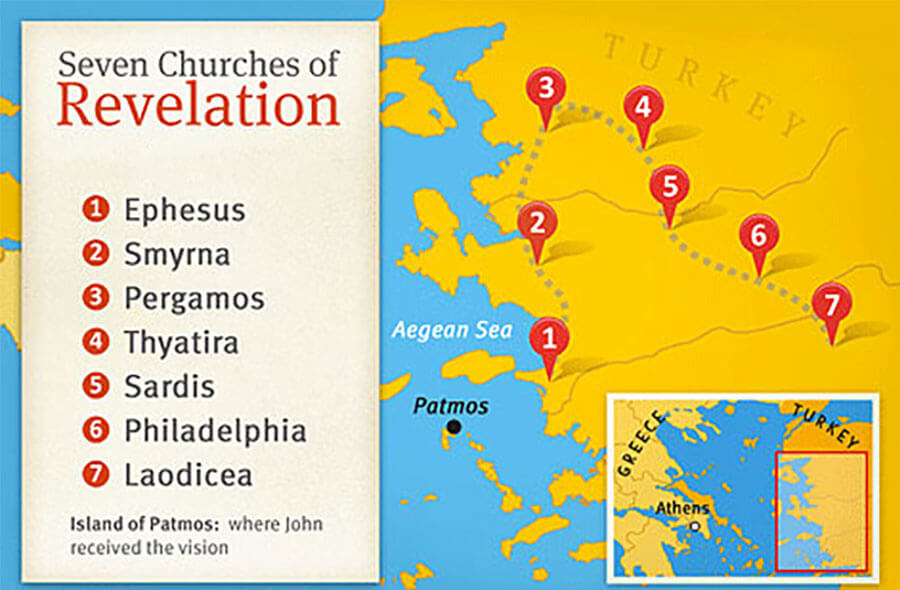
Seven Church Conditions during the Church Age – The Dead Congregation
As we study the prophetic messages to the seven congregations in this series, we will quickly see that they follow the same well-defined structure. The Lord begins each message with a greeting that relates back to John’s vision of Jesus, the Son of Man, in the heavenly scene in the first chapter of the Revelation. In other words, Jesus greets each congregation with an aspect of His person or His title that relates who He is to their particular circumstance. Jesus then commends the congregation for the good things He can say to them. Jesus then exhorted the congregations to take the appropriate action with a promise of blessings for obedience. The believers were to overcome must be understood within the context of the struggles and temptations each congregation faced. Furthermore, the Lord connects the congregation’s spiritual condition with the city’s character and reputation in each letter. (2)
Because the believers were being persecuted, the Lord wanted to encourage them as well as challenge them in areas where they were failing to live up to their high calling. He introduced Himself as the exalted Son of Man in a way that related to their individual situations, both physically and spiritually. He gave each congregation a word of promise to the overcomers and a warning of consequences if they did not obey His instructions. It is most important that we realize His words of promise were not to those who failed to repent. The Lord only had harsh words to those who were carnal and lukewarm in their commitment. The Lord did not give any of these congregations a watered-down, seeker-friendly, entertaining message. The very survival of the Lord’s work in the city depended on the believers responding positively to what the Lord told them. He promised blessings to the overcomers but chastening to those who did not heed His message. (2)
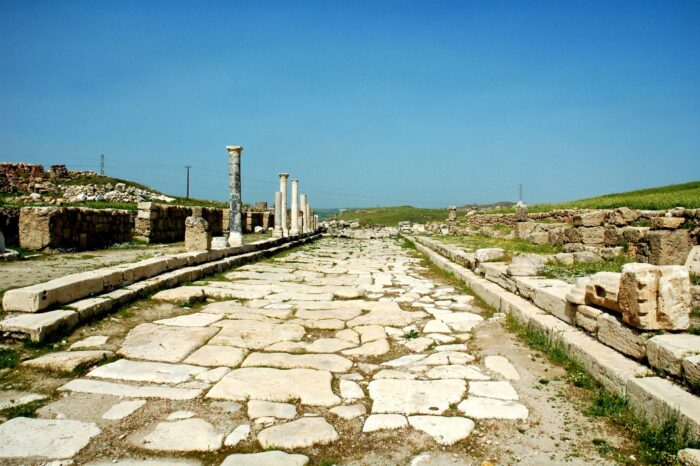
The Congregation at Laodicea
With this introduction, let’s get some background information about Laodicea that will help us understand why the Lord said what He did to the believers in this strategic city. Then we will study this prophetic message with a view of its practical application to our world and lives today. (2)

Background
I wonder what was going through his mind when God’s special mailman set out from Philadelphia to Laodicea. He had heard John’s letters read to each of the congregations. After delivering the Lord’s prophetic messages to the first six congregations, he is now on his way to the last of the seven communities of believers. (2)
Laodicea was about 130 miles inland and about 40 miles southeast of Philadelphia. It was located at a major east-west junction connecting the sea to the west to inland cities to the east. This strategic location helped make Laodicea a very prosperous city. (2)
Laodicea was founded by Antiochus II around 260 B.C. He must have been a wise husband, since he named the city after his wife, Laodicea. The city had six unique characteristics that the Lord used to relate to the spiritual condition of the congregation. (2)
First, Laodicea was a very wealthy city and the hub of banking and commerce in the region. We might think of it as the Wall Street of its geographic area. When Laodicea and the surrounding cities were destroyed in the earthquake of A.D. 60, Rome offered and gave financial assistance to help the cities rebuild. Laodicea was the only city in the region that refused to accept the aid. They considered themselves to be financially self-sufficient and didn’t need Roman assistance. They had plenty of money to rebuild, with ample left over to spend on discretionary purchases. The city embodied the concept of “conspicuous consumption.” (2)
Second, Laodicea was famous for raising a special breed of sheep that was found nowhere else in the region. The sheep produced soft, shiny, raven-black wool that was in great demand and sold for a premium price. The production and sale of this wool contributed greatly to the employment and prosperity of the city. People would come from all over the region to buy this beautiful product and spend their money with the local merchants. (2)
Third, Laodicea had a drinking problem. I don’t mean alcohol, but water. Hierapolis, only six miles north of Laodicea, was famous for its hot mineral waters. People from all over the region would flock to Hierapolis to take baths, as they believed the hot mineral waters had therapeutic value. Colosse was only eight miles south of Laodicea and was known for its pure cold water, which was great for drinking.The Romans built an aqueduct to bring water from nearby sources to Laodicea. But by the time the water reached Laodicea, it was lukewarm and had a high concentration of mineral content. So it was not great drinking water. Hot water was good for bathing, and cold water was good for drinking. But lukewarm water with a high mineral concentration was not much good for anything. If there was any town that needed bottled water, it was Laodicea. Because Laodicea, Hierapolis, and Colosse were so close to each other, they were considered a tri-city area. They were connected economically, socially, and spiritually. When the apostle Paul wrote his letter to the believers at Colosse, he mentioned Laodicea five times and Hierapolis once. (Colossians 2:1;4:13-16.) In fact, Paul mentions that he had written a letter to the congregation at Laodicea (Colossians 4:16). Now, that would make a good novel or movie: The Lost Letter of Laodicea. Paul also commends Epaphras, who had come to Rome seeking Paul’s advice on problems threatening the congregation at Colosse. Epaphras was from Colosse and may have started the congregation that met in Philemon’s house (Philemon 1:1-2) as well as the congregation at Laodicea. He ministered to the believers at Laodicea and Hierapolis (see Colossians 4:12-13). Paul even tells us the name of the person in whose house the Laodicean believers met. He sends greetings to the brethren in Laodicea, and to Nymphas (masculine)—which probably should read Nympha (feminine)—and the church meeting in his (or her) house (see Colossians 4:15). This was a small group of believers. (2)
Fourth, Laodicea was an important center for the treatment of eye diseases. There was a temple dedicated to Asklepios, and a medical school and clinic that was a leader in the study and treatment of the eyes. One of the graduates of the school was a man named Demosthenes Philalethes, who was the most renowned ophthalmologist of his time. The medical school had developed a salve and powder for treating eyes that was produced and sold throughout the region. As a result, Laodicea was the medical center of the area, which made the city even more prosperous. (2)
Fifth, because of its wealth, local Roman officials often abused their power and its hospitality, and forced the locals to buy them extra provisions such as clothing, food, or guest accommodations, or pay bribes or excessive taxes. Instead of respecting the locals, Roman officials violated common rules of hospitality, such as announcing themselves and knocking before entering. If they needed to “borrow” someone’s estate for the evening, they would not bother to knock or identify themselves. They would just barge right in and announce they were taking over. They requisitioned housing and lodging at will and took what they wanted. (2)
Sixth, Laodicea was called a “throne city.” In 40 B.C., Laodicea was attacked in an effort to overthrow the Romans. One of its citizens, named Zeno, along with his son, Polemo, held back the attackers. The Romans rewarded this family by making them kings over the area. Zeno and his son shared the throne and ruled as co-regents. Their descendants continued to rule for several generations and were featured on coins in the city.
Records indicate there was a sizable Jewish community at Laodicea that was assimilated and enjoyed the wealth that went with being a Laodicean. There is no record at this time of a synagogue or tension with the Christians in the city. Ancient Laodicea lies in ruins near the modern city of Denizli, which has a population of about 200,000. Let’s now read what the Lord has to say to His people at Laodicea. (2)
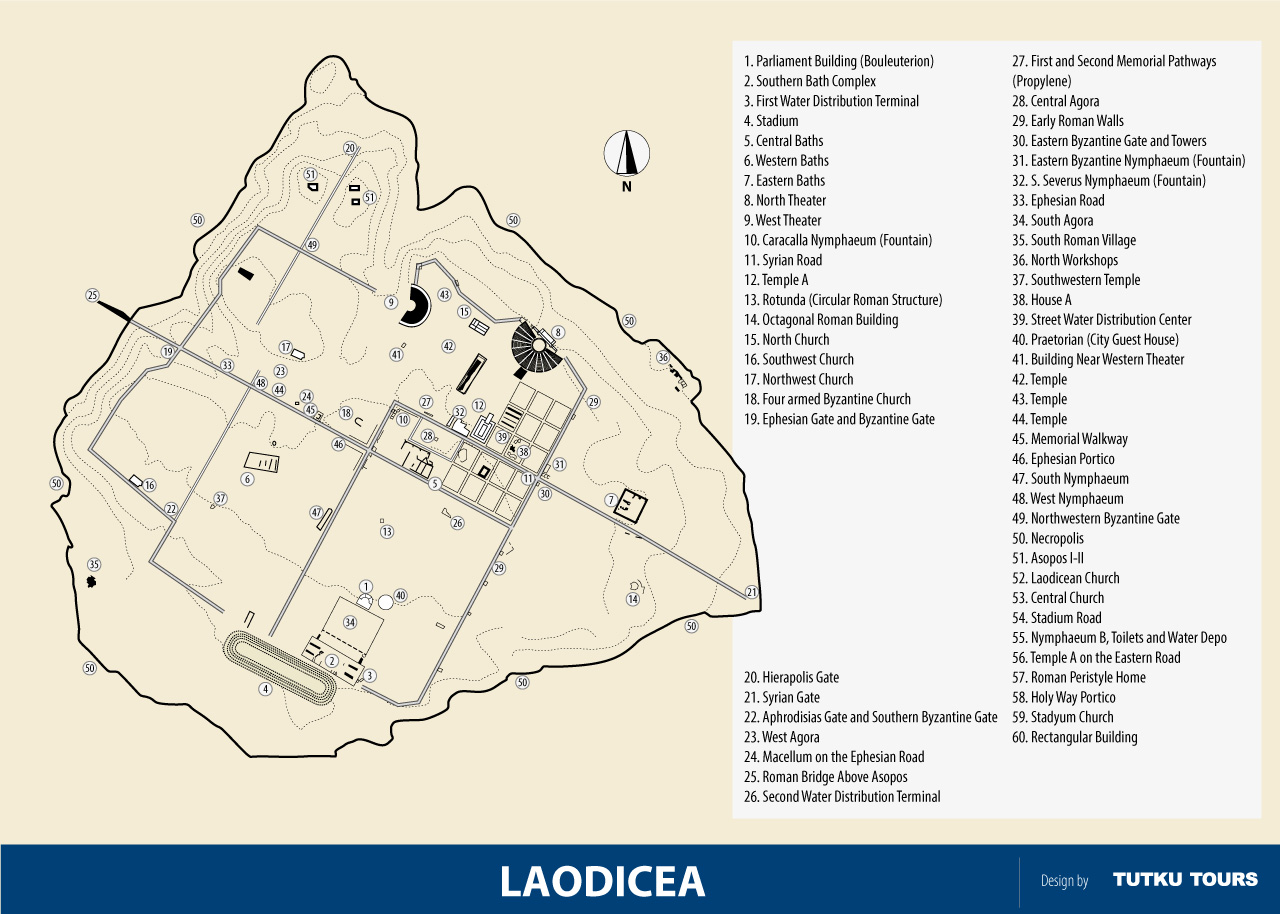
Select one of the Seven Cities in the Google Map (below), then select “View in Google Maps” on the left to explore each of the Seven Congregations of The Revelation.
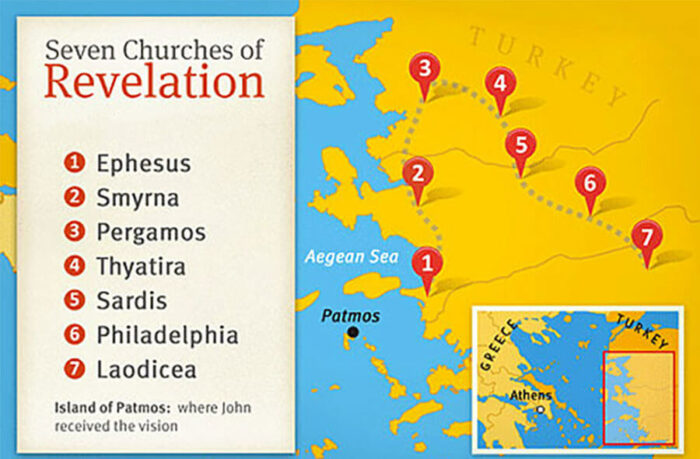
The Greeting
“To the angel of the church in Laodicea write the following: “This is the solemn pronouncement of the Amen, the faithful and true witness, the originator of God’s creation: (Revelation 3:14 NET)
The Lord greets the congregation at Laodicea with three statements.
First, He says that He is the “Amen.” The word amen basically means truth or reality. The word verily has the same meaning. In the King James Version, when Jesus would say, “Verily I say unto you,” He was emphasizing the absolute truth of His statement. God is the God of truth. He is the God of the amen. Before the people crossed into the land, Moses taught them a song, part of which says, (2)
As for the Rock, his work is perfect, for all his ways are just. He is a reliable God who is never unjust, he is fair and upright. (Deuteronomy 32:4 NET)
When King David called on God to deliver him from his enemies, he prayed,
Into Your hand I entrust my spirit; You redeem me, Lord, God of truth. (Psalm 31:5 NET)
Bible students recognize that Jesus quoted from this Scripture as He was about to die (1). The Lord was able to trust that His Father would not let His body see corruption, nor His soul stay in Sheol, because His Father had given Him His Word of truth. (2)
For You will not abandon me to Sheol; You will not allow Your Faithful One to see decay. (Psalm 16:10 HCSB)
Since God is truth, His Word is truth for always and for all times.
As David said,
Lord, Your word is forever; it is firmly fixed in heaven. (Psalm 119:89 HCSB)
As Isaiah said,
The grass withers, the flowers fade, but the word of our God remains forever.” (Isaiah 40:8 NET)
As Jesus said,
Heaven and earth will pass away, but my words will never pass away. (Matthew 24:35 NET)
The Hebraic understanding of the word amen is even more powerful. The word amen consists of the Hebrew letters the Aleph, the Mem, and the Nun. In Hebrew, it is pronounced as El/Mellech/N’eman, which means, “God the faithful King.” (2)
Unlike the congregation at Laodicea, God is a faithful, covenant-keeping God. We can trust His Word as truth and trust Him to keep His Word. He has fully revealed His Word in human form in the person of Jesus who is the glorified Son of Man we see in the Book of Revelation. This is why Paul writes, (2)
For every one of God’s promises is “Yes” in Him. Therefore, the “Amen” is also spoken through Him by us for God’s glory. (2 Corinthians 1:20 NET)
Second, because the Lord is the “Amen,” He is also the Faithful and True witness.
Jesus introduced Himself as the Faithful Witness.
From John, to the seven churches that are in the province of Asia: Grace and peace to you from “he who is,” and who was, and who is still to come, and from the seven spirits who are before his throne, and from Jesus Christ—the faithful witness, the firstborn from among the dead, the ruler over the kings of the earth. To the one who loves us and has set us free from our sins at the cost of his own blood and has appointed us as a kingdom, as priests serving his God and Father—to him be the glory and the power for ever and ever! Amen. (Revelation 1:4–6 NET)
Jesus is called Faithful and True:
Then I saw heaven opened and here came a white horse! The one riding it was called “Faithful” and “True,” and with justice he judges and goes to war. His eyes are like a fiery flame and there are many diadem crowns on his head. He has a name written that no one knows except himself. He is dressed in clothing dipped in blood, and he is called the Word of God. The armies that are in heaven, dressed in white, clean, fine linen, were following him on white horses. From his mouth extends a sharp sword, so that with it he can strike the nations. He will rule them with an iron rod, and he stomps the winepress of the furious wrath of God, the All-Powerful. He has a name written on his clothing and on his thigh: “King of kings and Lord of lords.” (Revelation 19:11–16 NET)
These statements connect to the Old Covenant where God says He will raise up a prophet like Moses:
I will raise up a prophet like you for them from among their fellow Israelites. I will put my words in his mouth and he will speak to them whatever I command. I will personally hold responsible anyone who then pays no attention to the words that prophet speaks in my name. (Deuteronomy 18:18–19 NET)
Unfortunately, the Laodiceans were not being faithful and true.
As the Faithful and True witness, we can trust the teachings and words of Jesus as recorded in the Bible. As He Himself said:
For I have not spoken from my own authority, but the Father himself who sent me has commanded me what I should say and what I should speak. And I know that his commandment is eternal life. Thus the things I say, I say just as the Father has told me.” (John 12:49–50 NET)
Paul said it this way:
After God spoke long ago in various portions and in various ways to our ancestors through the prophets, in these last days he has spoken to us in a son, whom he appointed heir of all things, and through whom he created the world. The Son is the radiance of his glory and the representation of his essence, and he sustains all things by his powerful word, and so when he had accomplished cleansing for sins, he sat down at the right hand of the Majesty on high. (Hebrews 1:1–3 NET)
Plato said, “We must lay hold of the best of human opinion in order to sail over the dangerous sea of life; unless we can find a stronger boat or some sure Word of God which will more surely and safely carry us.”
We have found that sure Word of God in written and human form.
Third, the Lord says that He is,
“To the angel of the church in Laodicea write the following: “This is the solemn pronouncement of the Amen, the faithful and true witness, the originator of God’s creation: (Revelation 3:14 NET)
In this statement, Jesus does not mean that He was created. The phrase means that He is both the creator and the heir of creation. Paul made the same statement in his letter to the believers at Colosse.
Paul said of Jesus,
He is the image of the invisible God, the firstborn over all creation, for all things in heaven and on earth were created by him—all things, whether visible or invisible, whether thrones or dominions, whether principalities or powers—all things were created through him and for him. He himself is before all things and all things are held together in him. He is the head of the body, the church, as well as the beginning, the firstborn from among the dead, so that he himself may become first in all things. For God was pleased to have all his fullness dwell in the Son and through him to reconcile all things to himself by making peace through the blood of his cross—through him, whether things on earth or things in heaven. (Colossians 1:15–20 NET)
John said of Jesus,
In the beginning was the Word, and the Word was with God, and the Word was fully God. The Word was with God in the beginning. All things were created by him, and apart from him not one thing was created that has been created. (John 1:1–3 NET)
We have already learned that Paul’s letter to the Colossians was also read to the believers at Laodicea. They both would have understood Paul and Jesus to mean that Jesus is the firstborn or heir of creation. The phrase refers to the custom in ancient times of the father of the family choosing one of his sons to be his heir. It was usually the oldest son, but not always. For example, Esau was born first, but his father Isaac did not choose him as the firstborn. Isaac chose Jacob to be the firstborn. The phrase “firstborn” is actually a title of the one who received the inheritance and priestly responsibilities of the family. The firstborn is given a double portion of the family resources and becomes the priest and spiritual head of the family. (2)
God chose His son Jesus, through whom He created all things, to be the firstborn or heir of creation.
David said it this way:
I will declare the Lord’s decree: He said to Me, “You are My Son; today I have become Your Father. Ask of Me, and I will make the nations Your inheritance and the ends of the earth Your possession. You will break them with a rod of iron; You will shatter them like pottery.” So now, kings, be wise; receive instruction, you judges of the earth. Serve the Lord with reverential awe and rejoice with trembling. Pay homage to the Son or He will be angry and you will perish in your rebellion, for His anger may ignite at any moment. All those who take refuge in Him are happy. (Psalm 2:7–12 HCSB)
Paul said it this way:
For to which of the angels did He ever say, You are My Son; today I have become Your Father, or again, I will be His Father, and He will be My Son? When He again brings His firstborn into the world, He says, And all God’s angels must worship Him. (Hebrews 1:5–6 NET)
Sans Commendation
Regrettably, the Lord had nothing praiseworthy to say to the leaders or the congregation of Sardis as a whole. Instead of living as salt and light, the community of believers assimilated into the lifestyle of the city. Sardis (1) and Laodicea are the only two churches out of the seven that do not receive some commendation. (2)
The Rebuke and Exhortation
‘I know your deeds, that you are neither cold nor hot. I wish you were either cold or hot! So because you are lukewarm, and neither hot nor cold, I am going to vomit you out of my mouth! Because you say, “I am rich and have acquired great wealth, and need nothing,” but do not realize that you are wretched, pitiful, poor, blind, and naked, take my advice and buy gold from me refined by fire so you can become rich! Buy from me white clothing so you can be clothed and your shameful nakedness will not be exposed, and buy eye salve to put on your eyes so you can see! All those I love, I rebuke and discipline. So be earnest and repent! (Revelation 3:15–19 NET)
Jesus relates their spiritual condition to the condition of the city. He rebukes them for being lukewarm in their faith and commitment. The hot mineral springs at Hierapolis were good for medicinal purposes. The cold water springs at Colosse were good for drinking purposes. But the lukewarm, mineral-laden water at Laodicea was nauseating. When you took a drink, you had to hold your nose because of the smell, and you almost regurgitated when you swallowed it. Gross! (2)
This rebuke of being lukewarm may not be what we might think. It is not that the believers were not doing anything, but that the Lord did not approve of their efforts. They were lukewarm toward Him. They were relying on their own self-sufficiency rather than trusting God. Because they had money, they did not see a need to rely on God. They thought they were spiritual and were doing good works because they were using their money for “the work of the church” or for the “ministry.” The Lord says their works are tasteless to Him and that He will spit them out of His mouth as the Laodiceans often did with their bad water. (2)
The Lord says that, spiritually speaking they are wretched, miserable, poor, blind, and naked. WOW! These are words that describe a beggar. In their eyes, they were rich, but in God’s eyes, they were spiritually poor.
The believers had prospered along with the city. Now, there is nothing wrong with God’s people prospering. It is a good thing. The Bible is clear that God desires to bless His people with financial resources. Poverty is not a blessing from God. But at Laodicea, the people were trusting in their wealth rather than in God who is the giver of wealth. (2)
The congregation had the same attitude of self-sufficiency demonstrated by the city. Because of its affluence, the city did not need help from Rome to rebuild after the earthquake of A.D. 60. Likewise, the congregation put their trust in their wealth. In their minds, they did not need the Lord to help them build their community. They had their money. While it is good that they were blessed financially, it was tragic that they did not see their need for spiritual blessings. They had not learned to trust God, because, in their minds, they didn’t need to do so. Sadly, there are many Laodicean congregations and believers today. Generally speaking, God has blessed American Christians with financial resources. Most have a job, a checking account, and some savings. They can pay their bills, take vacations, and eat at nice restaurants. This is good. Compared to most people in the world, American believers have plenty. (2)
Many think they are spiritual because they give to the building program, the “work of the church,” or to ministries, or to help the poor. But they have never seen the need to trust and rely on God or truly operate in faith because they have money in the bank. Just as it is easy to trust God for healing when we are not sick, it is easy to trust God for the resources we already have. This does not take faith. And without faith, it is impossible to please God.
Now without faith it is impossible to please him, for the one who approaches God must believe that he exists and that he rewards those who seek him. (Hebrews 11:6 NET)
The Lord counsels the congregation at Laodicea to do three things and relates each to the situation in the city.
First, in order to be truly rich, He counsels them to buy gold refined in the fire. Does He mean literal gold? Because of inflation and the depreciating value of the dollar, many financial advisers counsel people to buy gold. Is this what the Lord meant? The gold the Lord wants them to buy is genuine faith in God that has been refined through the challenges of life. Jesus said it is His gold that we get from Him, not from the gold merchants. God’s gold of faith comes from Him and is the true riches. Peter explains:
This brings you great joy, although you may have to suffer for a short time in various trials. Such trials show the proven character of your faith, which is much more valuable than gold—gold that is tested by fire, even though it is passing away—and will bring praise and glory and honor when Jesus Christ is revealed. (1 Peter 1:6–7 NET)
If the American economy continues to crumble, believers who have put their trust in their finances rather than in the Lord will be devastated unless they learn to put their trust in God. (2)
Peter adds:
You know that from your empty way of life inherited from your ancestors you were ransomed—not by perishable things like silver or gold, but by precious blood like that of an unblemished and spotless lamb, namely Christ. He was foreknown before the foundation of the world but was manifested in these last times for your sake. Through him you now trust in God, who raised him from the dead and gave him glory, so that your faith and hope are in God. (1 Peter 1:18–21 NET)
Second, the Lord gives them council to buy white garments from Him to cover their naked souls. Once again, the people were boasting about their expensive designer garments made with rich black wool. Even though they wore pricey garments, the Lord warns them that they are spiritually naked. The white garment symbolizes the garment of salvation and robe of righteousness that only the Lord can provide. He is the designer and the only merchant of this heavenly garment. The application for believers today should be obvious. With all of our material prosperity, many denominations, local congregations, and professing believers are spiritually naked. Their literal closets may be full of nice clothes, but their spiritual closet is empty. They glory in their financial independence, token religious activities, and spiritual talk, but they are self-righteous and naked before God. (2)
Third, the Lord gives them council that they should anoint their eyes with eye salve so they can see. As with His other statements, when the people heard this warning, they knew exactly what the Lord meant. While the Laodiceans had the leading medical center for healing of their eyes, they were spiritually blind. They could not see past the material world into the spiritual world. Their material prosperity and self-sufficiency clouded their spiritual vision.
Paul prayed for the following for the believers at Ephesus:
I do not cease to give thanks for you, remembering you in my prayers, that the God of our Lord Jesus Christ, the Father of glory, may give you the Spirit of wisdom and of revelation in the knowledge of him, having the eyes of your hearts enlightened, that you may know what is the hope to which he has called you, what are the riches of his glorious inheritance in the saints, and what is the immeasurable greatness of his power toward us who believe, according to the working of his great might that he worked in Christ when he raised him from the dead and seated him at his right hand in the heavenly places, far above all rule and authority and power and dominion, and above every name that is named, not only in this age but also in the one to come. And he put all things under his feet and gave him as head over all things to the church, which is his body, the fullness of him who fills all in all. (Ephesians 1:16–23 ESV)
This phrase “having the eyes your hearts enlightened” expresses what Jesus meant for the Laodiceans. He wanted them to have “the eyes of faith” to see and understand spiritual riches, wisdom, and priorities.
The Laodiceans had what we might call “a religious spirit.” They were religious, self-sufficient, and in need of nothing. They were blinded to their true spiritual state of being. Yet the Lord tells them that their spiritual condition is just the opposite of what they think of themselves. His final warning to them is tempered with the statement that He loves them (as family, with brotherly love) and because He loves them, He will rebuke (expose) and chasten (judge and discipline) those in the congregation that are truly His. If they are wise, they will eagerly receive His Words and repent. (2)
God is a God of mercy who gives His people the opportunity to judge and correct themselves. Yet, if they fail to examine themselves and repent, God will judge them corporately and individually as is appropriate. This is because:
God loves us and wants us to be holy more than He wants us to be happy.
Paul explains this for us:
But if we examined ourselves, we would not be judged. But when we are judged by the Lord, we are disciplined so that we may not be condemned with the world. (1 Corinthians 11:31–32 NET)
It is much easier and less painful to judge ourselves than for God to have to judge us. When we judge ourselves, our sins and the correction required are private between us and God. But when God judges us, He exposes our failings publicly. We already see this in the formal organized American Church, which has lost its way and is spiritually poor, blind, and naked. (2)
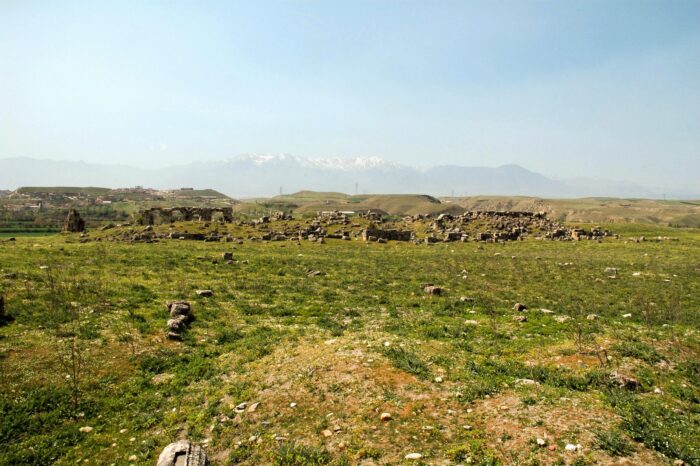
The Promise
Listen! I am standing at the door and knocking! If anyone hears my voice and opens the door I will come into his home and share a meal with him, and he with me. I will grant the one who conquers permission to sit with me on my throne, just as I too conquered and sat down with my Father on his throne. The one who has an ear had better hear what the Spirit says to the churches.’ ” (Revelation 3:20–22 NET)
When Jesus was on the earth, He said,
For where two or three are assembled in my name, I am there among them.” (Matthew 18:20 NET)
The tragedy of the Laodicean congregation is that the Lord is not in their midst. They are “having church,” but Jesus is not even there. The greater tragedy is that they don’t even know He is not present with them. They are so self-sufficient, that they can follow their programs and continue having services without the Lord. (2)
Unlike the Roman officials who barged their way into homes, Jesus says that He is standing outside the door and knocking. This is the Lord’s way of saying in words they could understand that He will not break down the door in a forced entry to the congregation or into our hearts. His love is extended to them, but they must recognize their need and invite His presence into their gatherings and into their lives. (2)
Because of the hardness of their hearts, their self-sufficiency, and their complacency, not everyone will hear nor recognize the Lord’s voice speaking to them. (2)
Jesus said,
My sheep listen to my voice, and I know them, and they follow me. I give them eternal life, and they will never perish; no one will snatch them from my hand. My Father, who has given them to me, is greater than all, and no one can snatch them from my Father’s hand. The Father and I are one.” (John 10:27–30 NET)
We can hear and recognize the voice of the Lord speaking to us. In Bible times, when someone knocked at the door of your house and you asked who was there, they would not give their name. They would say, “It is I .” You had to be able to recognize the person’s voice or you would not open the door for them. This was the ancient “home alarm security system.” (2)
We have an example of this in the Book of Acts. Peter had been arrested and put in prison. But the Lord sent an earthquake and set him free. Peter went to the house where the disciples were praying, but found that the door was locked. He knocked on the door and waited for someone to open it and let him in. (2)
Luke tells the story:
When he knocked at the door of the outer gate, a slave girl named Rhoda answered. When she recognized Peter’s voice, she was so overjoyed she did not open the gate, but ran back in and told them that Peter was standing at the gate. But they said to her, “You’ve lost your mind!” But she kept insisting that it was Peter, and they kept saying, “It is his angel!”Now Peter continued knocking, and when they opened the door and saw him, they were greatly astonished. (Acts 12:13–16 NET)
Rhoda recognized Peter’s voice. He didn’t say, “It is Peter.” She knew his voice because she knew him. When Jesus stands outside the door knocking, He doesn’t say, “It is Jesus.” His people will recognize His voice and let Him into their lives. Those who don’t know Him will not recognize His voice and will not let Him into their denominations, congregations, or personal lives. (2)
To those who do know His voice and let Him into their lives, the Son of Man makes a wonderful promise. He says,
Listen! I am standing at the door and knocking! If anyone hears my voice and opens the door I will come into his home and share a meal with him, and he with me. (Revelation 3:20 NET)
Now, this does not mean that the Lord will take you to your favorite restaurant. In Bible times, eating together was a sign of friendship and fellowship. To those in the Laodicean congregation who heard his voice, opened the door, and repented of their materialistic self-sufficiency, the Lord would commune with them. They would enjoy His presence, His power, and His provision. (2)
Finally, to the overcomer, the Lord further promises that he will sit with Him on His throne, meaning that he will share in His rule over the nations. When the Lord returns, He will not only sit on the throne of His father David in Jerusalem as King of Israel. He will also sit on the throne of His heavenly Father as King of kings and Lord of lords. He will rule the nations as God’s earthly representative. And His covenant people will rule with Him. (2)
Jerusalem will be the ultimate “throne city” and the final home of God’s people. Jeremiah tells us that Jerusalem will be called the throne of God: (2)
At that time the city of Jerusalem will be called the Lord’s throne. All nations will gather there in Jerusalem to honor the Lord’s name. They will no longer follow the stubborn inclinations of their own evil hearts. (Jeremiah 3:17 NET)
Daniel gives us the following prophetic words of hope when Messiah reigns on the earth:
I was watching in the night visions, “And with the clouds of the sky one like a son of man was approaching. He went up to the Ancient of Days and was escorted before him. To him was given ruling authority, honor, and sovereignty. All peoples, nations, and language groups were serving him. His authority is eternal and will not pass away. His kingdom will not be destroyed. (Daniel 7:13–14 NET)
Then the kingdom, authority, and greatness of the kingdoms under all of heaven will be delivered to the people of the holy ones of the Most High. His kingdom is an eternal kingdom; all authorities will serve him and obey him.’ (Daniel 7:27 NET)
If the Lord’s message to Laodicea applies to your organization, your ministry, or your life, let us repent and do what He says so we can be overcomers. Let us heed the following words of Jesus:
So then, don’t worry saying, ‘What will we eat?’ or ‘What will we drink?’ or ‘What will we wear?’ For the unconverted pursue these things, and your heavenly Father knows that you need them. But above all pursue his kingdom and righteousness, and all these things will be given to you as well. (Matthew 6:31–33 NET)
The Invitation
We began this series by noting that the Book of Revelation is about the glorious Son of Man who sits on His throne in Heaven at the right hand (place of honor) of His Father. Because of the suffering and tribulation faced by His people in the first century, Jesus sent a prophetic message to the seven congregations in Asia Minor. He chose to reveal His messages to John, who experienced an apocalyptic vision by which He received and recorded the words of the Lord. (2)
In each message, Jesus reminded them that He knew of their works, praised them when He could, exhorted them and warned them of their failures, and promised incredible blessings to those who heard His Word, obeyed His Word, and overcame. (2)
While these messages were given to seven literal congregations of the first century, they are certainly relevant for God’s people today. The world still rejects the rule of God, and human nature is the same. We still face the challenges of losing our first-love zeal for the Lord; overcoming fear in the midst of persecution; holding fast to true biblical faith and sound doctrine; and resisting moral compromise, spiritual deadness, worldliness, materialism, self-sufficiency, apathy, and blindness to our own spiritual need. (2)
With the world becoming more and more anti-Judeo-Christian, our challenge is to hear what God is saying to His corporate community of believers and to our lives personally, and how to face an uncertain future with faith and confidence that God’s Word is true. While God is already judging the nations and those who have fallen away from the faith, His promises are “Yes and Amen” to those who overcome. (2)
As we face the future of living in an anti-God world, let us have the conviction and courage not to “fix our sandals” before the gods of government and the new world order. Let us not compromise for the sake of convenience and comfort and a false sense of security and materialism. But let us overcome by the blood of the Lamb and the word of our testimony. He that has an ear let him hear what the Spirit is saying to us today. (2)
May our glorious Lord help you be a faithful overcomer. May you live each day to the fullest with a joyous expectation of the good that He has promised. Until He comes,
I pray that He may grant you, according to the riches of His glory, to be strengthened with power in the inner man through His Spirit, and that the Messiah may dwell in your hearts through faith. I pray that you, being rooted and firmly established in love, may be able to comprehend with all the saints what is the length and width, height and depth of God’s love, and to know the Messiah’s love that surpasses knowledge, so you may be filled with all the fullness of God. Now to Him who is able to do above and beyond all that we ask or think according to the power that works in us— to Him be glory in the church and in Christ Jesus to all generations, forever and ever. Amen. (Ephesians 3:16–21 NET)
PROMISES TO THE OVERCOMERS IN THE REVELATION
Meditate on these promises and let God’s Spirit reveal to your spirit the glorious Son of Man. See what John saw and be blessed. (2)
The overcomers will…
- Eat of the Tree of Life.
- Not be hurt by the second death.
- Eat the hidden manna of the life of God.
- Receive a white stone of acceptance with a new name.
- Have power over the nations.
- Rule with the Lord with a rod of iron.
- Receive the Bright and Morning Star.
- Be clothed in white garments.
- Have their names written in the Book of Life.
- Hear the Lord confess their names as His own before His Father and the angels.
- Be a pillar in the Temple of God.
- Receive a new name to manifest the glory of God forever.
- Sit with Messiah on His throne.
“I, Jesus, have sent my angel to testify to you about these things for the churches. I am the root and the descendant of David, the bright morning star!” And the Spirit and the bride say, “Come!” And let the one who hears say: “Come!” And let the one who is thirsty come; let the one who wants it take the water of life free of charge. (Revelation 22:16–17 NET)
Seven Church Conditions during the Church Age:
Please see the following links for more information from Revelation Chapters 1-3 concerning the condition of churches during the Church Age:
- Prologue
- Jesus the Messiah!
- The Legalistic Congregation (Ephesus)
- The Persecuted and Faithful Congregation (Smyrna)
- The Persecuted and Compromised Congregation (Pergamos)
- The Licentious Congregation (Thyatira)
- The Dying Congregation (Sardis)
- The “Canceled” and Faithful Congregation (Philadelphia)
- The Dead Congregation (Laodicea)
Detailed Description
Revelation Chapters Revelation Chapters 4:1 thru 5:14
Please click the following link for more information from Revelation Chapters 4:1-5:14:
Part XI: The Lord of the Scroll – Daniel’s 70th Week (God’s Throne Room)
Shalom
(Security, Wholeness, Success)
Peace
Then he said to them, “Therefore every expert in the law who has been trained for the kingdom of heaven is like the owner of a house who brings out of his treasure what is new and old.” (Matthew 13:52 NET)
(1) Select the link to open another article with additional information in a new tab.
(2) Booker, R. (2011). The overcomers: series- understanding the book of Revelation. Shippensburg, PA: Destiny Image.
DR. Richard Booker, MBA, Ph.D., is an ordained Christian minister, President of Sounds of the Trumpet, Inc., and the Founder/Director of the Institute for Hebraic-Christian Studies. Prior to entering the ministry, he had a successful business career. He is the author of 35 books, numerous Bible courses, and study materials, which are used by churches and Bible schools around the world.
Dr. Booker has traveled extensively for over 30 years, teaching in churches and at conferences on various aspects of the Christian life as well as Bible prophecy, Israel, and the Hebraic roots of Christianity. He and his wife Peggy have led yearly tour groups to Israel for over 25 years. For 18 years, Dr. Booker was a speaker at the Christian celebration of the Feast of Tabernacles in Jerusalem. This gathering is attended by 5,000 Christians from 100 nations.
Dr. Booker and Peggy founded the Institute for Hebraic-Christian Studies (IHCS) in 1997 as a ministry to educate Christians in the Hebraic culture and background of the Bible, to build relationships between Christians and Jews, and to give comfort and support to the people of Israel. Their tireless work on behalf of Christians and Jews has been recognized around the world, as well as by the Knesset Christian Allies Caucus in Jerusalem.
Dr. Booker is considered a pioneer and spiritual father and prophetic voice in teaching on Bible prophecy, radical Islam, Israel, Jewish-Christian relations, and the biblical Hebraic roots of Christianity. He has made over 400 television programs, which can be seen worldwide on God’s Learning Channel. To learn more about his ministry, see his Web site and online bookstore at www.rbooker.com. If you want to invite Dr. Booker to speak at your congregation or conference, you may contact him at [email protected].
(4) Pictures from: Bolen, T. Pictorial Library of Bible Lands, Volumes 1-20 Purchased from https://www.bibleplaces.com and used with permission.




